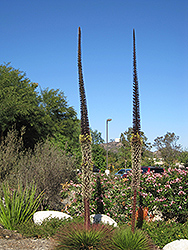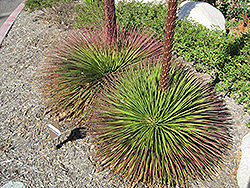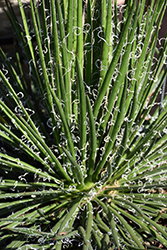It's all about ...
plants

Plant Height: 3 feet
Flower Height: 10 feet
Spread: 3 feet
Sunlight:
![]()
Hardiness Zone: 9a
Other Names: Century Plant
Description:
This unusual variety has very narrow, dark green leaves that are spineless and flexible, set in a dense rosette; towering spikes with yellow flowers when rosettes mature; a great visual accent for rockeries or dry gardens
Ornamental Features
Twin-flowered Agave features bold spikes of yellow pincushion flowers rising above the foliage from late summer to early fall. It has attractive green evergreen foliage. The succulent narrow leaves are highly ornamental and remain green throughout the winter.
Landscape Attributes
Twin-flowered Agave is a multi-stemmed evergreen shrub with an upright spreading habit of growth. Its relatively coarse texture can be used to stand it apart from other landscape plants with finer foliage.
This shrub will require occasional maintenance and upkeep, and usually looks its best without pruning, although it will tolerate pruning. Deer don't particularly care for this plant and will usually leave it alone in favor of tastier treats. Gardeners should be aware of the following characteristic(s) that may warrant special consideration;
- Suckering
Twin-flowered Agave is recommended for the following landscape applications;
- Accent
- Rock/Alpine Gardens
- General Garden Use
- Container Planting
Planting & Growing
Twin-flowered Agave will grow to be about 3 feet tall at maturity extending to 10 feet tall with the flowers, with a spread of 3 feet. It tends to fill out right to the ground and therefore doesn't necessarily require facer plants in front. It grows at a slow rate, and under ideal conditions can be expected to live for approximately 10 years.
This shrub should only be grown in full sunlight. It prefers dry to average moisture levels with very well-drained soil, and will often die in standing water. It is considered to be drought-tolerant, and thus makes an ideal choice for a low-water garden or xeriscape application. It is not particular as to soil pH, but grows best in poor soils. It is highly tolerant of urban pollution and will even thrive in inner city environments. This species is not originally from North America. It can be propagated by multiplication of the underground bulbs.
Twin-flowered Agave makes a fine choice for the outdoor landscape, but it is also well-suited for use in outdoor pots and containers. Its large size and upright habit of growth lend it for use as a solitary accent, or in a composition surrounded by smaller plants around the base and those that spill over the edges. It is even sizeable enough that it can be grown alone in a suitable container. Note that when grown in a container, it may not perform exactly as indicated on the tag - this is to be expected. Also note that when growing plants in outdoor containers and baskets, they may require more frequent waterings than they would in the yard or garden. Be aware that in our climate, most plants cannot be expected to survive the winter if left in containers outdoors, and this plant is no exception. Contact our experts for more information on how to protect it over the winter months.
This plant is not reliably hardy in our region, and certain restrictions may apply; contact the store for more information.


